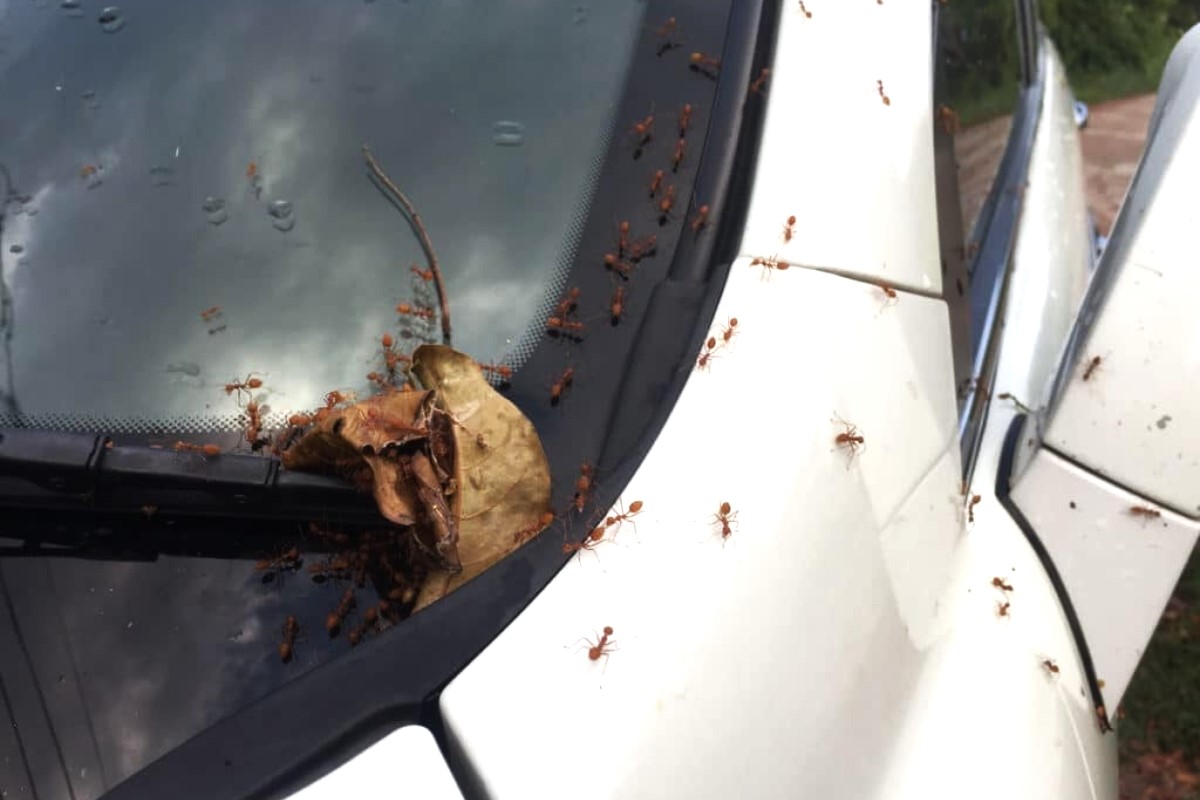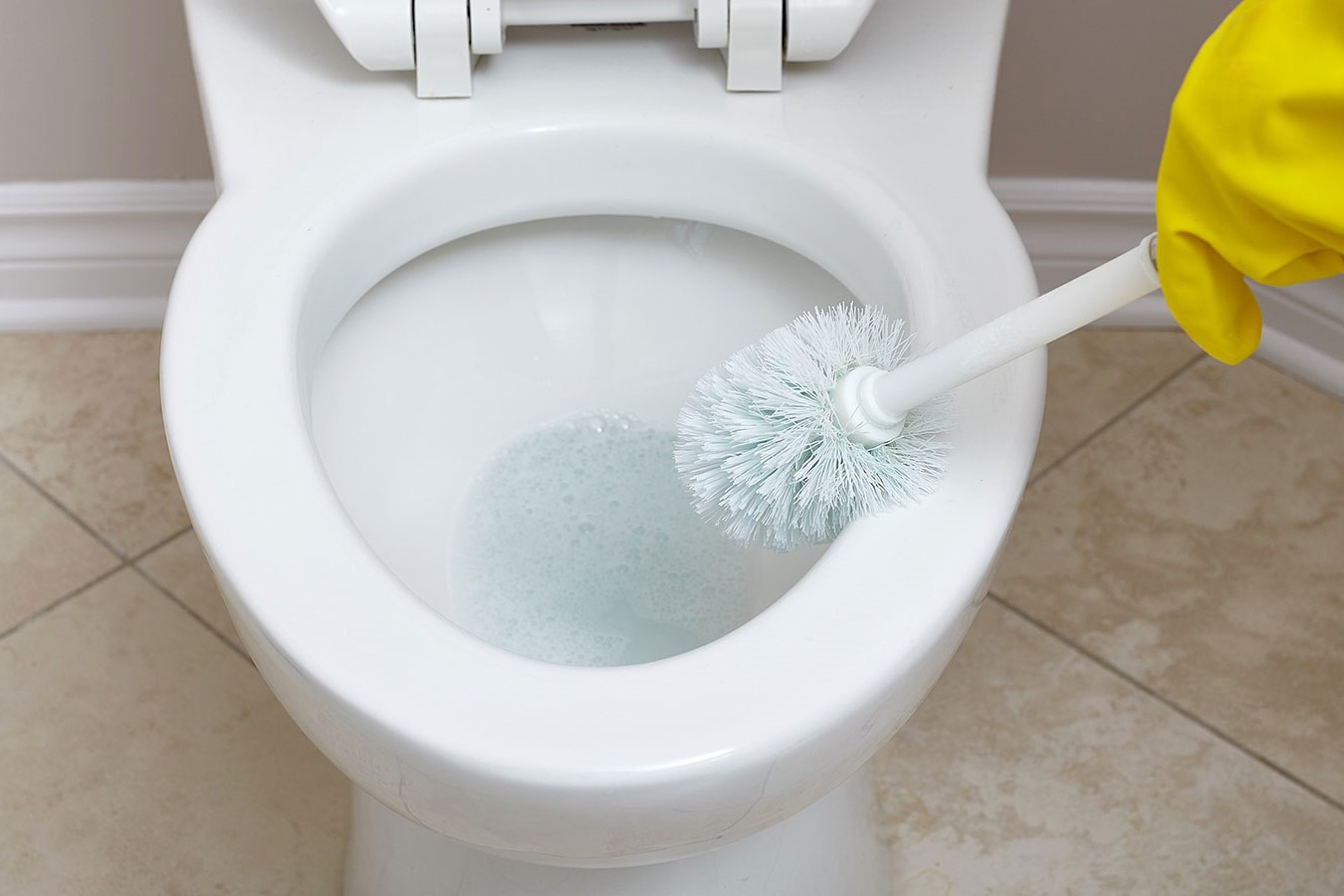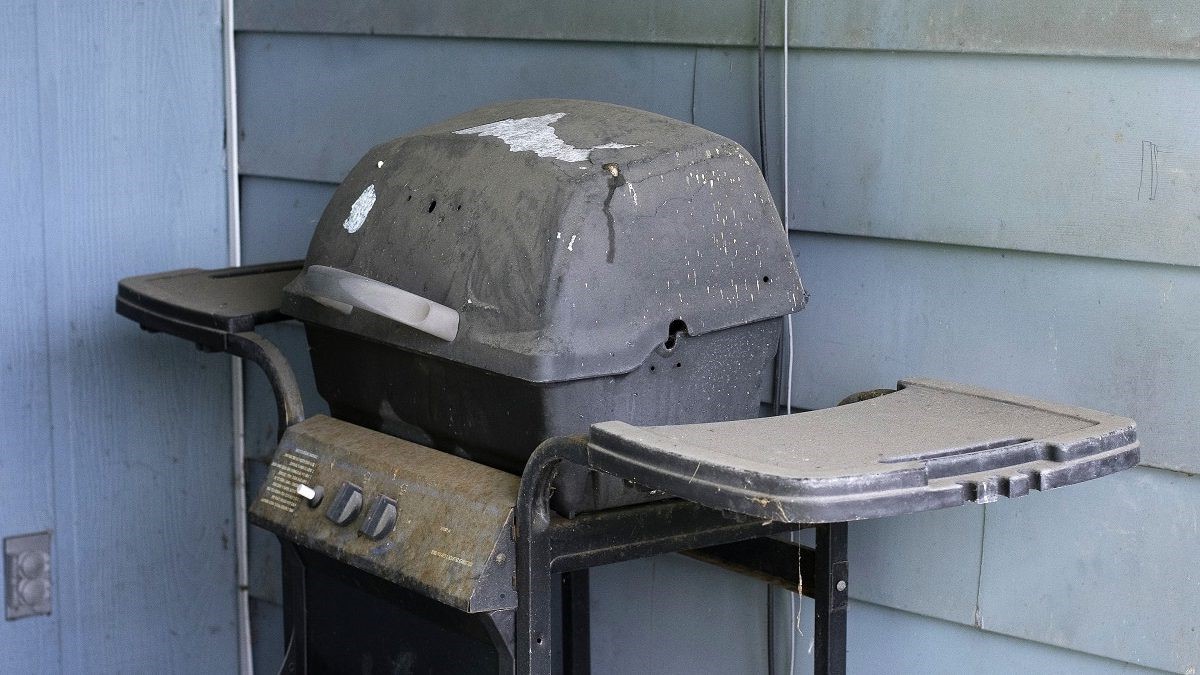Home>Automotive>How To Get Rid Of Ants In Your Car


Automotive
How To Get Rid Of Ants In Your Car
Published: March 7, 2024
Learn effective ways to eliminate ants from your car with our expert automotive tips. Keep your vehicle ant-free with our proven methods.
(Many of the links in this article redirect to a specific reviewed product. Your purchase of these products through affiliate links helps to generate commission for Noodls.com, at no extra cost. Learn more)
Table of Contents
Introduction
Dealing with an ant infestation in your car can be a frustrating and bothersome experience. Whether you've discovered a few stray ants or a full-blown colony making themselves at home, it's essential to address the issue promptly to prevent further inconvenience. Ants can be attracted to your car for various reasons, such as seeking food, water, or shelter. Understanding how to identify and eliminate these unwanted passengers is crucial for maintaining a clean and comfortable vehicle.
In this comprehensive guide, we will explore effective methods for identifying and addressing ant problems in your car. From natural remedies to commercial ant baits and preventive measures, you'll gain valuable insights into reclaiming your car from these persistent pests. By implementing the strategies outlined in this article, you can restore your car's cleanliness and prevent future ant infestations, ensuring a pleasant and hassle-free driving experience.
Read more: How To Get Rid Of Sugar Ants
Identifying the Ant Problem in Your Car
Discovering ants in your car can be a disconcerting experience, prompting the need for swift action to address the issue. Identifying the presence of ants in your vehicle is the first step in effectively resolving the problem. Here are some key indicators to help you determine if your car has become an unwelcome habitat for these persistent pests:
-
Sightings of Ants: The most obvious sign of an ant infestation in your car is the visual presence of these tiny insects. Whether you notice them crawling on the dashboard, seats, or floor mats, spotting ants inside your vehicle is a clear indication of a potential problem.
-
Trails of Ants: Ants often leave behind visible trails as they move from one location to another in search of food or nesting sites. These trails may be noticeable on surfaces such as the interior of your car doors, windows, or any areas where crumbs or spills are present.
-
Presence of Ant Nests: Ants may establish nests in various areas of your car, such as the trunk, under the seats, or within the engine compartment. If you notice small piles of debris, such as wood particles or soil, in these areas, it could indicate the presence of an ant nest.
-
Food Debris: Ants are attracted to food and beverage spills, crumbs, and other organic matter. If you observe an accumulation of food debris in your car, particularly in hard-to-reach areas, it may serve as a potential food source for ants, leading to an infestation.
-
Unusual Odors: In some cases, an ant infestation in your car may be accompanied by unusual odors. These odors can result from the presence of ant pheromones, which are chemical signals used by ants to communicate with one another and mark their foraging trails.
By remaining vigilant and observant, you can promptly identify the presence of ants in your car and take the necessary steps to address the issue effectively. Once you have confirmed the existence of an ant problem, you can proceed to implement targeted strategies to eliminate the infestation and prevent future occurrences.
Preventing Ants from Entering Your Car
Preventing ants from entering your car is a proactive approach to avoid potential infestations and maintain a clean and pest-free vehicle. By implementing preventive measures, you can significantly reduce the likelihood of ants finding their way into your car. Here are effective strategies to keep ants at bay:
-
Regular Cleaning: Maintaining a clean interior is essential for deterring ants from entering your car. Regularly vacuuming the seats, floor mats, and crevices where crumbs and food debris can accumulate helps eliminate potential food sources that attract ants. Additionally, promptly cleaning up spills and food residues can prevent ants from being lured into your vehicle.
-
Seal Entry Points: Inspect your car for any potential entry points that ants could exploit. Check for gaps around doors, windows, and other openings, and seal them as needed to prevent ants from gaining access to the interior of your car. Using weather stripping or sealant can help fortify these vulnerable areas and create a barrier against unwanted intruders.
-
Mindful Food Storage: Avoid leaving food or beverages in your car for extended periods. When transporting snacks or meals, ensure that they are stored in sealed containers to minimize the risk of attracting ants. By practicing mindful food storage, you can reduce the likelihood of creating an enticing environment for ants within your vehicle.
-
Regular Inspections: Routinely inspecting and cleaning your car's exterior can also contribute to preventing ants from entering. Check for any debris, such as fallen fruits or crumbs, that may accumulate in the vicinity of your car. By maintaining a tidy exterior environment, you can minimize the factors that attract ants to your vehicle.
-
Natural Repellents: Consider using natural ant repellents, such as essential oils like peppermint, cinnamon, or citrus, to create a deterrent for ants. Applying these oils to cotton balls and placing them strategically in your car can help discourage ants from venturing inside. Additionally, planting ant-repelling herbs, such as mint or lavender, near your parking area can serve as a natural barrier against ants.
By proactively implementing these preventive measures, you can create an environment that is less conducive to ant infestations, thereby safeguarding your car from potential pest-related issues. Taking these steps not only helps in preventing ants from entering your car but also contributes to maintaining a clean and inviting vehicle interior for your comfort and peace of mind.
Natural Remedies for Getting Rid of Ants in Your Car
When faced with an ant infestation in your car, natural remedies can serve as effective and environmentally friendly solutions to eliminate these unwanted pests. By harnessing the power of natural ingredients and repellents, you can address the ant problem in your car without resorting to harsh chemicals. Here are several natural remedies that can help you get rid of ants in your car:
-
Vinegar Solution: A simple yet potent natural remedy for repelling ants involves using a vinegar solution. Mix equal parts of white vinegar and water in a spray bottle and generously apply the solution to areas where ants are present or likely to enter, such as door sills, floor mats, and the trunk. The strong scent of vinegar disrupts the ants' pheromone trails, deterring them from entering your car.
-
Diatomaceous Earth: Diatomaceous earth, a natural and non-toxic substance, can be sprinkled in areas where ants are active, such as around the car's exterior and interior. This powdery substance effectively dehydrates and kills ants upon contact, making it an eco-friendly solution for combating ant infestations.
-
Citrus-Based Sprays: Citrus fruits, particularly lemons and oranges, contain natural compounds that repel ants. Create a citrus-based spray by boiling citrus peels in water, allowing the solution to cool, and then transferring it to a spray bottle. Spritz the citrus spray in areas where ants are present to deter them from lingering in your car.
-
Baking Soda and Powdered Sugar: A mixture of baking soda and powdered sugar can be used as a natural bait to attract and eliminate ants. Combine equal parts of baking soda and powdered sugar and place small amounts of the mixture in shallow lids or containers near ant trails. The ants are attracted to the sugar but are effectively exterminated upon ingesting the baking soda.
-
Essential Oils: Certain essential oils, such as peppermint, tea tree, and lavender oil, possess strong scents that repel ants. Dilute a few drops of your chosen essential oil with water and spray the solution in areas where ants are active. Alternatively, soak cotton balls in the diluted essential oil and strategically place them in your car to discourage ant infestations.
By incorporating these natural remedies into your ant control efforts, you can effectively eliminate ants from your car while minimizing the use of synthetic chemicals. These natural solutions not only help in eradicating the immediate ant presence but also contribute to creating a safer and more sustainable environment within your vehicle.
Using Commercial Ant Baits and Sprays
Commercial ant baits and sprays are valuable tools for effectively combating ant infestations in your car. These products are specifically formulated to target ants and can provide a convenient and efficient means of eradicating these persistent pests. When selecting commercial ant baits and sprays, it is essential to choose products that are designed for indoor use and safe for application in enclosed spaces such as your car. Here's a detailed look at how these commercial solutions can help address ant problems in your vehicle:
Read more: How To Get Rid Of Ants
Ant Baits:
Commercial ant baits are designed to attract ants with a bait that contains an enticing food source laced with insecticidal ingredients. When ants consume the bait and carry it back to their nest, it effectively eliminates the entire colony, including the queen. This approach offers a comprehensive solution for eradicating ants at the source, preventing future infestations. Ant baits are available in various forms, including gel baits, bait stations, and granular formulations, providing flexibility in application based on the specific ant infestation in your car.
Ant Sprays:
Commercial ant sprays are formulated to directly target and eliminate ants upon contact. These sprays often contain insecticidal compounds that effectively disrupt the ants' nervous system, leading to their swift extermination. When using ant sprays in your car, it is crucial to select products that are labeled for indoor use and safe for application in confined spaces. Additionally, opt for ant sprays that offer residual protection, creating a barrier to deter future ant activity in your vehicle.
Application and Safety:
When applying commercial ant baits and sprays in your car, it is important to follow the manufacturer's instructions carefully. Ensure that the products are used in accordance with the specified guidelines to maximize their effectiveness and minimize any potential risks. Prioritize safety by ventilating the car during and after application, and avoid direct contact with the products to prevent skin irritation or inhalation of fumes. Additionally, store these products securely and out of reach of children or pets to prevent accidental exposure.
Effectiveness and Long-Term Control:
Commercial ant baits and sprays offer a targeted and efficient approach to eliminating ant infestations in your car. By disrupting ant colonies and eradicating individual ants, these products provide effective control over the immediate infestation while offering residual protection against future incursions. When used as part of an integrated pest management strategy, commercial ant baits and sprays can contribute to long-term ant control, ensuring a pest-free environment within your vehicle.
Incorporating commercial ant baits and sprays into your ant control efforts can significantly enhance the effectiveness of your pest management strategy. By leveraging these specialized products, you can address ant infestations in your car with precision and confidence, reclaiming a clean and comfortable environment for your driving experience.
Read more: How To Get Rid Of Ants In Yard
Keeping Your Car Clean to Avoid Ant Infestations
Maintaining a clean and clutter-free car interior is paramount in deterring ant infestations and ensuring a pleasant driving experience. A proactive approach to cleanliness not only minimizes the risk of attracting ants but also contributes to a hygienic and inviting vehicle environment. Here's a detailed exploration of the essential practices for keeping your car clean to avoid ant infestations:
Regular Vacuuming and Cleaning:
Frequent vacuuming of the car's interior, including the seats, floor mats, and crevices, is crucial for removing food crumbs, spills, and other debris that can entice ants. Pay particular attention to areas where food particles may accumulate, such as between and under the seats, to eliminate potential food sources for ants. Additionally, wiping down surfaces with a damp cloth and using interior cleaning products can help maintain a pristine and uninviting environment for pests.
Prompt Spill Cleanup:
Addressing spills and stains promptly is essential for preventing ants from being drawn to your car. Whether it's a beverage spill, food residue, or crumbs, swift cleanup minimizes the likelihood of attracting ants seeking nourishment. Keep a supply of cleaning wipes or a small portable vacuum in your car to address spills as soon as they occur, preventing them from becoming a magnet for pests.
Trash Disposal:
Regularly removing trash and waste from your car is vital in reducing the availability of food sources for ants. Implement a habit of disposing of wrappers, food packaging, and other disposable items in designated trash receptacles outside of your vehicle. By keeping the interior free of clutter and trash, you can significantly diminish the appeal of your car as a potential feeding ground for ants.
Exterior Maintenance:
In addition to interior cleanliness, maintaining the exterior of your car is equally important in preventing ant infestations. Regularly washing the exterior and removing any organic debris, such as fallen fruits or food remnants, from the vicinity of your car helps minimize factors that may attract ants. By upholding a clean exterior environment, you create a barrier against potential ant incursions into your vehicle.
Storage Organization:
Organizing and storing items in your car thoughtfully can contribute to a tidy and ant-resistant interior. Utilize storage compartments, organizers, and containers to keep snacks, groceries, and personal belongings secure and contained. Minimizing loose items and ensuring proper storage reduces the likelihood of food spillage and clutter that could attract ants.
By adhering to these practices and maintaining a vigilant approach to cleanliness, you can effectively mitigate the risk of ant infestations in your car. A clean and well-maintained vehicle not only enhances your driving comfort but also serves as a deterrent to unwanted pests, ensuring a pristine and inviting environment for your travels.
Conclusion
In conclusion, addressing an ant infestation in your car requires a combination of vigilance, proactive measures, and targeted solutions to effectively eliminate these persistent pests. By identifying the signs of ant presence, implementing preventive strategies, utilizing natural remedies, and leveraging commercial ant control products, you can reclaim a clean and pest-free environment within your vehicle.
The process begins with vigilant observation to identify the presence of ants in your car, including sightings of ants, visible trails, and potential nesting sites. Once the infestation is confirmed, proactive measures such as regular cleaning, sealing entry points, mindful food storage, and natural repellents can help prevent ants from entering your car in the first place.
In the event of an ant infestation, natural remedies such as vinegar solutions, diatomaceous earth, citrus-based sprays, baking soda and powdered sugar mixtures, and essential oils offer effective and environmentally friendly means of eradicating ants from your car. These natural solutions not only address the immediate infestation but also contribute to creating a safer and more sustainable environment within your vehicle.
Commercial ant baits and sprays provide targeted and efficient solutions for combating ant infestations, offering comprehensive control over the immediate infestation and residual protection against future incursions. When used in accordance with the manufacturer's instructions, these specialized products can significantly enhance the effectiveness of your pest management strategy, ensuring a pest-free environment within your vehicle.
Furthermore, maintaining a clean and clutter-free car interior is essential in deterring ant infestations and ensuring a pleasant driving experience. Regular vacuuming, prompt spill cleanup, trash disposal, exterior maintenance, and storage organization are essential practices for keeping your car clean and uninviting to pests.
By integrating these strategies and solutions, you can effectively address ant infestations in your car while creating a hygienic, inviting, and pest-free environment for your driving experience. Embracing a proactive and holistic approach to ant control not only safeguards your vehicle from infestations but also contributes to your overall comfort and peace of mind as you embark on your journeys.












